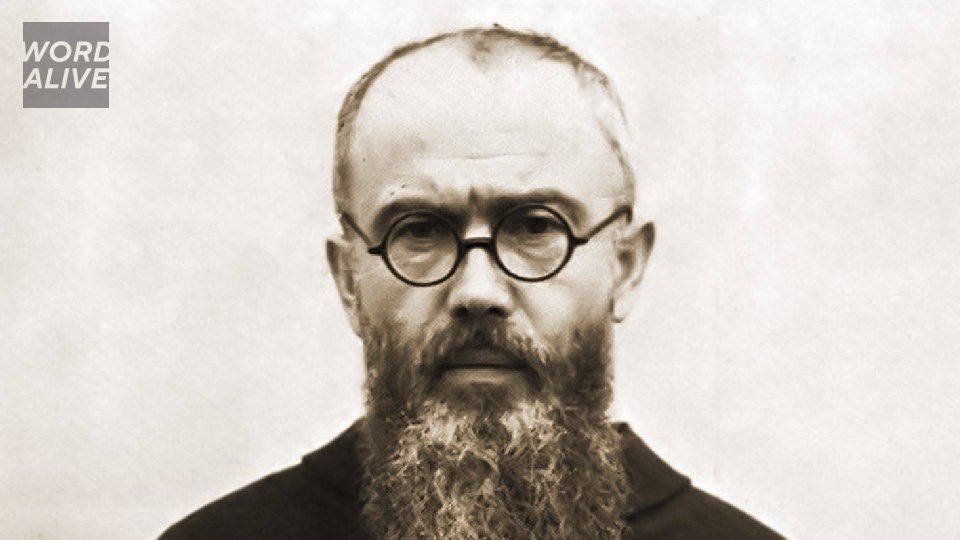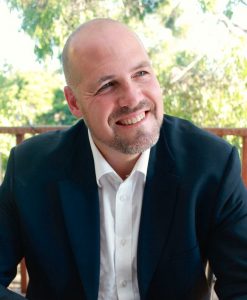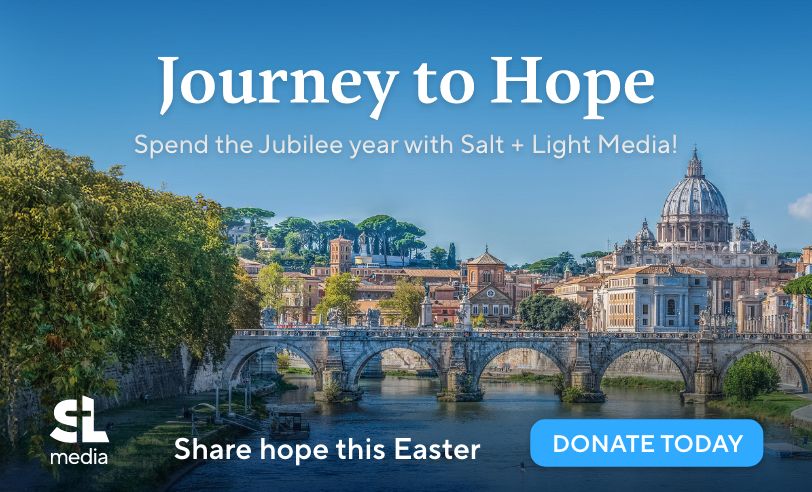Stepping stone or stumbling block? | Word Alive
Steve Lawrence
Friday, September 10, 2021

St. Maximilian Kolbe (Source: Wikimedia Commons)
Stepping stone or stumbling block?
A reflection for the Twenty-fourth Sunday in Ordinary Time, Year B
by Steve Lawrence
Maximilian Kolbe, Auschwitz prisoner number 11670, did the unthinkable. In August 1941, ten prisoners stood on an insufferably hot parade ground. They had been randomly chosen by the brutal Nazi Commandant Fritsch to go to their deaths in the starvation bunker, as punishment and a warning for the many others against trying to escape. One of the ten chosen pleaded for mercy, being a married man with children. Kolbe stood out of line and risked violent retaliation. “I’ll go in his place,” he stated quietly and yet firmly. He had seen and heard the desperation of his fellow Pole, whose weeping and pleading moved his heart. Despite not knowing the man personally, Kolbe proposed to replace him in the starvation bunker. Such selflessness, centred on the good of another, even to the point of one’s own significant detriment or death, is not something which comes easily. Nor does it simply emerge in a heroic moment. It is rather the effect of the culmination of a lifetime of such acts, beginning with small sacrifices and developing into virtuous habits of giving, habits that develop embedded character. Kolbe was known for that throughout his life, which was why he attracted so many already in the years before the war. He built up a thriving community of Franciscans, widely disseminated a highly effective publication, and provided refuge for 3000 Jewish refugees fleeing Nazi-occupied Poland. His ultimate offering in Auschwitz became possible because of the numerous selfless offerings made daily, earning him the title from Pope John Paul II of “martyr for charity”. Kolbe’s determination mirrors that of Jesus, who knows that His mission from the Father will be hard but will be followed by glory: “The Son of Man must suffer greatly and be rejected by the elders, the chief priests, and the scribes, and be killed, and rise after three days” (Mark 8:31). It is a mission that will be entered into with an attitude of radical trust in the ultimate victory of God: “The Lord GOD is my help, therefore I am not disgraced; I have set my face like flint, knowing that I shall not be put to shame” (Isaiah 50:7). It is this path on which the believer is called to walk, “to deny himself, take up his cross and follow” Jesus. (Mark 8:36). Many of the messages in our contemporary culture speak the opposite idea, to put ourselves first, to avoid hardships under all circumstances, to be comfortable. The promotion of this kind of self-preserving attitude was what Peter pushed onto Jesus, and for which he received a stern rebuke: “Get behind me Satan!” That kind of thinking, Jesus points out, is an obstacle to God, and those who think like that are the enemy (the word satanas, from the Greek, means “opponent” or “enemy”). Selfishness is the opposite of love. Those who promote acts of love are stepping stones (the name Peter means “rock”), but those who oppose love are stumbling blocks. It is amazing how quickly one can transfer between being a stepping stone and a stumbling block in a day. I believe the key to walking the path of self-giving is made by those who spend time contemplating the presence of Jesus, who ponder His faithful love and who choose – ahead of time – to follow that path in the moment of testing. Prayer is the key! This is certainly true in my experience. A long time of personal prayer, usually first thing in the morning, fills the day that follows with grace, with light, with an awareness of my eternal purpose, and helps me to grow in my awareness of the needs of those around me, and my capacity to cherish and serve them. Spending time with Love Himself transforms me to receive His love, to love Him back, and to love others! Prayer is a doorway to allow God’s holiness entry into our being. It heals, unifies, strengthens, and illuminates us for the Divine purpose for which we were created – to be saints! And we know it is the saints who change the world. They make time, exert effort, and use their talents to empower and enable others to realize their purpose and mission in life, which inevitably continues the upward and outward spiral of positive culture building. Saints create families, of one sort or another, as Maximilian Kolbe did, to bring love into the world. When there is not love in the world, these people don’t complain, they respond by putting love in the world, and then it is found that there is love in the world. At the very moment he was arrested, prior to being taken to Auschwitz, Kolbe's final words to his Franciscan brothers were “Forget not love!” What will you be today – a stepping stone or a stumbling block?The readings for the Twenty-fourth Sunday in Ordinary Time, Year B, are Isaiah 50:5-9 James 2:14-18 Mark 8:27-35
 Steve Lawrence, of Altum Leadership Group, a consultancy for Catholic leaders, is married with six children. He played professional Australian Football for twelve years in Melbourne, was Director of Evangelisation and Catechesis for the Sydney World Youth Day 2008, and Director of the Emmanuel School of Mission in Rome. His latest published works are Make Your Mark Five Hidden Keys to Great Leadership (Wilkinson, 2019) and Raising Fathers Fathering from the Frontline: 12 Men’s Stories (Connor Court, 2020). Steve's next book, The Tiny Book for Giant Men, is in the editing phase and is due to be published in the latter part of 2021.
Steve Lawrence, of Altum Leadership Group, a consultancy for Catholic leaders, is married with six children. He played professional Australian Football for twelve years in Melbourne, was Director of Evangelisation and Catechesis for the Sydney World Youth Day 2008, and Director of the Emmanuel School of Mission in Rome. His latest published works are Make Your Mark Five Hidden Keys to Great Leadership (Wilkinson, 2019) and Raising Fathers Fathering from the Frontline: 12 Men’s Stories (Connor Court, 2020). Steve's next book, The Tiny Book for Giant Men, is in the editing phase and is due to be published in the latter part of 2021.

Click here for all articles in the Word Alive series
Related Articles:
Tag: conception
CNS Vatican Report: Advent at the Vatican opens with a focus on respect for life
Friday, December 3, 2010
 Matthew Harrison
Matthew Harrison
Pope Benedict XVI called on the universal Church to marked the first Sunday of Advent with a Vigil for Nascent Life. Catholic News Service’s Carol Glatz and John Thavis have more on the Holy Father’s effort to promote the sanctity and dignity of life. To download Flash Player please click here
1
SUPPORT LABEL
$50
$100
$150
$250
OTHER AMOUNT
DONATE
Receive our newsletters
Stay Connected
Receive our newsletters
Stay Connected













